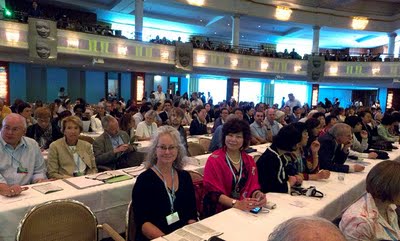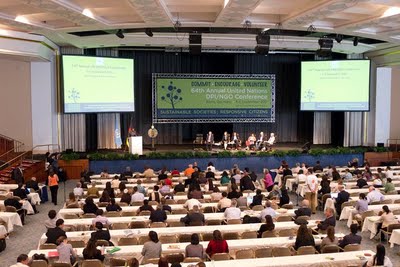|
#memoriesat60
The Messiness, Democracy and Hope of Civil Society The 64th Annual United Nations DPI/NGO Conference: Sustainable Societies, Responsive Citizens Bonn, Germany, 3-5 September 2011 Priscilla Otani, president-elect for our Women's Caucus for Art, and I attended as representatives of our NGO. Here is part of my report: The happy sounds of many languages filled the six floors of the Maritim Hotel atrium as the conference began. At the Opening Ceremony, I found myself surrounded by businesswomen from China, people in niqab, saris, and caftans, youth, and many nuns (Catholic, Buddhist, Hindi) some of the representatives of more than 400 NGOs in attendance. We quickly coalesced into the "we the peoples" that starts the Charter of the United Nations. Preamble to the Charter of the United Nations. I soon had a sense of both the messiness and wonder of civil society and how years of UN conferences have distilled a method for collecting the varied perspectives, views and recommendations asked for, in this case, by the General Assembly in preparation for the Rio+20 Conference on Sustainable Development scheduled for June 2012 in Brazil. At each of the Roundtables, to which all were invited, high-level experts spoke on the topics after which respondents from government reflected back or challenged them on their thoughts. Four to five questions at a time were then taken from the audience and the panel responded. UN staff recorded each of these discussions. The same process, minus the respondents, occurred in the many workshops. Side events gave even more intimate discussion opportunities as did the exhibits, both of which WCA was a part. UN Conference board members worked tirelessly throughout the three days to add to, edit and condense all of this information into the final declaration that reflected the expectations of NGO participants and civil society leaders for the governments attending Rio+20. The declaration was openly discussed for a final time at the closing. Individuals were able to come to the mike, ask for word changes, minor deletions and additions, before the assembly was asked, by show of applause, to accept or reject the declaration before it was given to the German government for presentation to the U.N. General Assembly. We need to TEACH PEOPLE FLEXIBILITY - how they can do best with current knowledge and how to change as new information arises, how to deal with a tomorrow that is so different from today without getting lost and fearful. We no longer have TIME to polarize. We need to end cynicism. We need to celebrate courage and innovation. Felix Dodds, Chair, 64th DPI/NGO Conference - "THE FUTURE IS NOT A GIFT, it is an achievement. The future does not belong to those who are content with today or to those who lack the courage to force change that is needed." Everyone needs to mobilize, volunteer and take action. At closing ceremony, Flavia Pansieri, Head of the Consultative Forum of the Heads of UN Agencies in Germany, asked everyone who has engaged in a cause without expectation of payment to stand - 100% stood. The spirit of VOLUNTARISM in participants from developing and developed countries alike was huge. "Of course we volunteer, why wouldn't we do our part for the future of the world." Not everything is worse. Many positive accomplishments are not picked up by the world's media. The eco village concept - conscious design for long-term sustainability and resilience - is rapidly expanding with over 600 established eco villages around the world and 100+ in the U.S. The country of Senegal is committing a large portion of its budget to transforming struggling traditional villages into ecovillages. Here is the story about Senegal's eco villages Fair Trade Towns - communities in which people and organizations use their everyday choices to increase sales of Fairtrade products and bring about positive change for farmers and workers in developing countries - are also expanding with over 1000 internationally and 23 in the U.S. as of April. http://www.fairtradetowns.org To combat the serious lack of drinking water in areas of western China, the Water Cellars for Mothers Project developed and built water collecting devices, each holding a year's worth of rain water for one family. Over 1 million people benefited from this project in 2010 Water Cellars for Mothers Project #womenscaucusforart
1 Comment
|
AuthorA place to decant my brain, to capture inspiration and share fresh insights. [Posts from 2015 onward] Categories
All
Archives
July 2024
|



 RSS Feed
RSS Feed